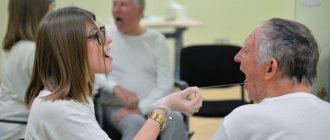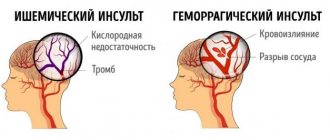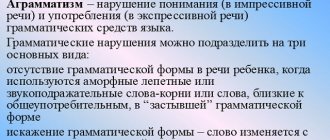Forms of aphasia
In the first days after a cerebrovascular accident, speech disorders in patients may manifest themselves in the form of total aphasia
: the patient does not speak and does not understand speech addressed to him.
Total aphasia after a few days or weeks may be replaced by sensory
or
motor aphasia
: the patient begins to understand speech addressed to him, but communicates with others using a speech “embolus” - a stereotypically repeated sound combination, syllable or word, sometimes well intoned.
There are several forms of aphasia
However, two main
forms of aphasia
:
- sensory
- motor
Disinhibition of speech at the initial stages of aphasia development
The most effective method of eliminating aphasia and preventing the problem from worsening is to bring speech sequences to an automatic level by performing exercises such as singing, repeating phrases, finishing sentences, tongue twisters, etc.
When disinhibiting, the speech therapist completely pronounces the sentence to the last word, pronouncing only one syllable. The patient’s task is to finish the last word. First, the speech therapist examines the patient, determines what is easier for the patient, verbs, nouns, adjectives.
For example: the goat bleats, and the dog ... (barks); grass in the yard, firewood on the grass); Summer, sun, ... (heat); take matches, light... (fire).
Also, when disinhibiting, it is possible to achieve very good results using sayings. For example: you can’t even pull a fish out of ... (pond) without difficulty.
If such exercises cause difficulties for the patient, and more often than not, the song helps. The speech therapist begins to sing and when the patient begins to recognize the song, a smile spreads across his face.
Sensory aphasia
Wernicke's sensory aphasia
is a violation of the understanding of speech, both someone else’s and one’s own, while maintaining the ability to speak.
Occurs when the left temporal lobe of the brain is damaged. As a rule, the patient speaks quite willingly and a lot, but due to the loss of understanding of what he hears, he does not understand either himself or those around him. The form of sensory aphasia
is characterized by two main features:
- the patient’s speech is incomprehensible to others due to the lack of meaning in it (misunderstanding of one’s own speech leads to loss of control over it, the patient invents new words, replaces letters or syllables in existing ones, swaps words, pronounces incoherent strings of words and sentences)
- the speech of others and his own is incomprehensible to the patient (due to impaired perception of sound, loss of distinction in the sound composition of words, the patient does not understand the meaning of what he hears)
Causes
Among the factors that provoke the disease may be any pathological process that negatively affects the brain centers in the frontal, temporal or parietal lobe of the cortex, as well as the nerve pathways connecting these parts of the brain. In this case, the speech centers located in these areas suffer, which affects the formation of speech and its pronunciation. The most common causes of aphasia include:
- tumor process in the brain;
- acute or chronic circulatory disorder, stroke;
- traumatic brain injury;
- abscess in the brain;
- consequences of epilepsy, in which the epileptic focus disrupts the normal functioning of the brain;
- poisoning with heavy metals or poisons;
- diseases associated with the breakdown of myelin, a protein that ensures the conduction of nerve impulses through fibers;
- degenerative diseases of the brain associated with the destruction of its structure, the development of dementia and other neurological symptoms.
The exact cause of aphasia can only be determined based on the results of a comprehensive examination of the patient and a study of the underlying disease.
Motor aphasia
Broca's motor aphasia
is a violation of the ability to speak while maintaining the ability to understand speech. Occurs when the frontal lobe of the brain (Broca's motor speech center) is damaged. The patient has difficulty pronouncing or does not pronounce words, mainly pronouncing simple words or syllables. The main features of the form of motor aphasia are:
- the patient’s speech is poorly distinguishable, but is often understandable and meaningful, accompanied by eloquent gestures (the patient has difficulty pronouncing and moving from one word to another)
- the speech of others is well understood by the patient
Dialogical work
Our main work in the correction of aphasia is dialogic speech.
Scheme of work in this direction:
- the patient repeats the prepared answer phrase;
- the speech therapist prompts the first one or two syllables, and the patient must complete the word or phrase;
- the patient must select one or more words from those spoken by the speech therapist;
- the patient must answer the speech therapist’s question without prompting.
Remember, aphasia is treatable. If in adults the recovery process is difficult and takes a lot of time, then in children aphasia is treated quite quickly and effectively. The use of effective techniques, songs, and negotiation exercises significantly accelerates the patient’s process of developing coherent speech.
Our speech pathologists and speech pathologists conduct speech therapy classes in Almaty for the correction of aphasia in both adults and children. If you need help or advice, please contact us!
Treatment of aphasia
Treatment of aphasia
in most cases it is successful. There are special speech restoration programs for different forms of aphasia, which are differentiated. In the process of individual work with patients with aphasia, a speech therapist modifies the techniques and methods of correctional pedagogical work available in the arsenal of defectology, bringing his own individual experience.
Treatment of aphasia
consists not only in restoring ability, but also in restoring the affected part of the brain, which is the cause of the speech disorder.
If you or your loved ones have speech problems, make an appointment with a speech therapist. At the “Your Health” clinic, appointments are conducted by a highly qualified specialist with many years of experience in the specialty “Speech Therapy” Ella Borisovna Rothbert, who will help you choose the optimal method of speech correction.
There are several forms of aphasia, which are characterized by a violation of either speech understanding or speech reproduction. In severe cases of aphasia, a person’s ability to both understand others and speak is impaired. This speech disorder most often occurs in older people as a consequence of severe brain diseases (stroke, tumors) or brain injuries.
In children, aphasia is diagnosed when organic brain damage occurs after the child has mastered speech. In this case, aphasia leads to disruption of its further development, sometimes to the collapse of formed speech. Aphasia often leads to profound disability.
The possibilities for compensation for speech and mental disorders in children and adults are sharply limited. Adults with aphasia, as a rule, lose their profession and have difficulty adapting to everyday life. Misunderstanding of others and the inability to express one’s desires cause behavioral disorders: aggression, conflict, irritability.
Difference between aphasia and other speech disorders
Aphasia differs from other speech disorders:
- with aphasia, unlike dyslalia, in addition to impaired pronunciation, the patient loses the ability to understand words;
- Unlike dysarthria, with aphasia there are no problems with tongue mobility. The activity of the articular apparatus in dysarthria is constantly limited;
- hearing loss – hearing impairment, with aphasia there are no auditory abnormalities;
- with aphasia, the child experiences mental retardation. It is secondary in nature, so this disorder should not be confused with mental retardation.
Kinds
Depending on the severity of the disease, the doctor may diagnose:
- partial aphasia, in which full speech alternates with noticeable impairments;
- total aphasia, in which speech has significant impairments and requires correction.
Complications of aphasia
In the absence of timely treatment and specialist supervision, aphasia can cause:
- persistent disorder, in which there is a lack of understanding of spoken words and an inability to form one’s own speech;
- problems with social adaptation due to the inability to communicate and establish contact with others.
Manifestations of the disease
The group of symptoms that manifests itself to a greater extent depends on which area of the brain is affected when sensory aphasia occurs. In any case, this is Wernicke’s area, where the speech analyzer is located, but the specific characteristics of sensory aphasia depend on whether the left or right hemisphere is affected: the perception or reproduction of speech is more impaired.
For a patient with sensory aphasia, words are just a collection of sounds. In some cases, recognition is partially preserved: the patient can identify the object shown to him as living or non-living, large or small. But he is unable to name the object itself. At the same time, the patient, as a rule, can perform simple actions on command - stand up, raise his hand, turn around. Without treatment, the disease progresses and leads to a complete misunderstanding of what is being said. Your own words are also not perceived as speech. Due to the lack of control by hearing, words become incoherent and are pronounced incorrectly and sometimes unrecognizable. Intonation also suffers. Pronunciation may be restored, but the construction of phrases will not appear on its own. Patients try to talk, and get angry when those around them do not understand them: a patient with sensory aphasia is sure that he speaks clearly.
Writing is also impaired to the same extent as speech. But the ability to read is lost only slightly - mainly due to confused stresses that distort the meaning of words.
Differential diagnosis
Despite the fact that aphasia is a neurological disease, the approach to diagnosis is multidisciplinary. To accurately determine the clinical and morphological manifestations of the disease, it is necessary to fully conduct a diagnostic examination of the patient.
On the basis of the Clinical Institute of the Brain there is a powerful diagnostic department, which has all the necessary equipment and specialists in related fields, which ensures a high degree of information content of the diagnostic data provided.
Topical diagnosis plays the most important role in patient examination. This procedure is performed by a neurologist or neurosurgeon. To do this, all data from the history of the present disease are collected, special symptoms are determined, as well as a physical examination of the patient. Along with an examination by a neurologist, the victim should be examined by a psychotherapist to exclude or confirm mental disorders and establish the degree of social adaptation of the patient with aphasia. The degree of reliability of the data obtained largely depends on the qualifications of the specialist and his practical experience.
To diagnose aphasia, studies such as:
- Computed and magnetic resonance imaging. Both studies can be performed without contrast and with contrast. For visualization of soft tissues, it is more informative to conduct an MRI study.
- Plain radiography of the head and neck. X-rays are performed if there is a history of traumatic brain injury to confirm or exclude defects in hard tissues (cranium).
- Ultrasound examination – sonography and ultrasound color Doppler mapping of cervical (cervical) vessels. This ultrasound examination is performed to exclude damage to the vessels of the neck.
In addition to instrumental studies, an important component of a diagnostic examination is a set of laboratory tests. It is necessary to determine the patient’s blood type and Rh status, determine the lipid profile and general blood test.
Advantages of visiting the Yusupov Hospital
Treatment of aphasia of various forms in Moscow is carried out by experienced specialists from the neurological department of the Yusupov Hospital. By trusting us with your health, you can be sure of receiving qualified medical care. Each patient is guaranteed an individual approach. In their work, doctors use proven modern techniques, which ensures a positive result of therapy.
Despite the high quality of services provided, prices are affordable (more details on the price list can be found on the website). In addition to neurology, services are available in other areas, including oncology, surgery, and therapy. For convenience, payment for treatment can be made in cash or by bank transfer. To make an appointment with a specialist, just call the numbers provided or fill out an application online, leaving your contact information.
Prevention and prognosis
After a person has developed aphasia, it is important to exclude repeated disturbances in brain activity. For the purpose of secondary prevention, dispensary observation of such patients is carried out. Periodic examination by a neurologist and cardiologist can significantly reduce the risk of relapse of the underlying disease that led to the development of aphasia. In general, when following the recommendations of specialists, a person with aphasia manages to achieve social adaptation and live at an acceptable standard of living.
Clinical Brain Institute Rating: 3/5 — 5 votes
Share article on social networks
How does the human speech apparatus function?
The communicative characteristics of people are directly related to the formation of the second signaling system or speech apparatus. All human achievements are primarily associated with the progressive development of communication abilities, which allowed people to actively exchange accumulated information and interact together.
It is important to note that the human brain synthesizes and perceives speech thanks to developed speech centers. Both speech centers are located in the cerebral cortex and are named after the researchers who discovered them.
- Broca's speech area is a speech-motor or simply motor center responsible for the formation of human oral speech. This center is responsible for motor function: the phonological and syntactic structure of speech coming from a person. The motor center is a kind of verbal analyzer and is responsible for the work of the facial muscles and tongue.
- Wernicke's speech center is a center responsible for the analysis and perception of incoming speech information from the outside. Wernicke's area has an anatomical localization in the temporal gyrus and is usually located in one dominant hemisphere. In addition to processing incoming speech information, the Wernicke Center also provides intonation characteristics of outgoing speech.
Despite the anatomical separation of the two speech zones listed above, they constantly interact with each other and work harmoniously as a single whole. Perception and analysis of incoming information, further interpretation of the received data and the formation of a response are the most important functions that formed the second reflex signaling system of a person.









